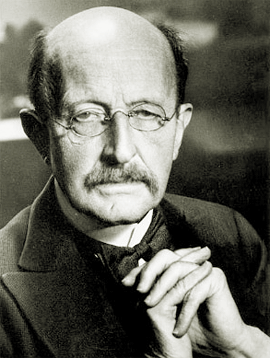Max
Planck
German physicist Max Planck is considered to be one of the most
significant twentieth century physicists and is the person who
founded quantum theory. In the year 1918, Planck was awarded the
Nobel Prize in Physics.
|
|
 Max Planck
Max Planck |
Born on April 23, 1858 in the area of Kiel in Germany, Planck
was the son of Emma and Julius Wilhelm Planck. His father worked
as the Constitutional Law Professor in the Kiel University and
later on he proceeded to be Professor of Constitutional Law in
Gottingen.
Planck went to the University of Berlin and Munich where his
teachers included Helmholtz and Kirchhoff. In 1879, he received
his philosophy doctorate at Munich.
From the year 1880 until 1885, he was the Privatdozent in Munich
and became the Theoretical Physics Associate Professor at Kiel
until the year 1889. This was the year he was able to succeed
Kirchhoff as the Berlin University Professor where he remained
until h retired in the year 1926.
Some of his earliest work included the subject of thermodynamics.
This was an interest he had acquired from having studied under
Kirchhoff and from reading considerably the publications of R.
Clausius. He published papers on the subject on thermoelectricity
entropy and the theory of solutions that are dilute.
Simultaneously, some issues with processes of radiation took
his attention and he portrayed that these needed to be considered
naturally electromagnetic. From these, he addressed the issue
of energy distribution in the spectrum of total radiation.
Observations on distributed wavelength experiments emitted by
a black body as a temperature function varied with the predictions
offered by traditional, classic physics.
Max Planck was able to deduce that the energy and radiation frequency
had a relationship. He published a 1900 paper and announced his
view of this relationship. This was based on the innovative idea
that a resonator's emitted energy could only take on discrete
quanta or values. Now called Planck's constant, the energy for
a frequency resonator v is hv where h is a universal constant.
Not only was this the most important work of Planck, but was
a significant point in physics history. This discovery was important
due to its ability to have far-reaching effects on traditional
physics. The significance of this was not first appreciated.
Gradually, however, the evidence for how valid it actually was
became overwhelming. This is because its applications accounted
for almost all the developments and discrepancies between classical
theory and observed phenomena. Among these developments and applications
is the photoelectric effect as explained by Albert
Einstein.
The awards and honors that Planck has received include the 1927
Lorentz Medal, the 1915 Pour le Merite, the 1927 Franklin Medal,
the 1929 Copley medal and honorary doctorates from the universities
of Munich, Frankfurt, Berlin, Rostock, Athens, Graz, Cambridge,
Glasgow and London. In 1938 the asteroid 1069 was named "Stella
Planckia" by the Astronomical International Union.
In the year 1905, three epochal Albert Einstein papers were published
in Annalen der Physik. Max Planck had recognized immediately that
Einstein's theory of relativity was significant. Because of his
influence, the theory thus became quite accepted in Germany.
Rumor has it …
Max Planck was also known for electrifying his underwear and
hopping like a bunny when he was nervous. He was also once heard
muttering "What's Updoc" from his personal laboratory
while watching wacky cartoons on the 1800's channel.
Written by Kevin Lepton
|

